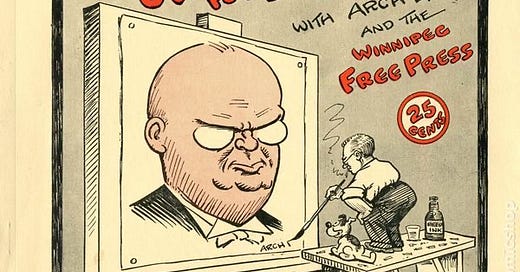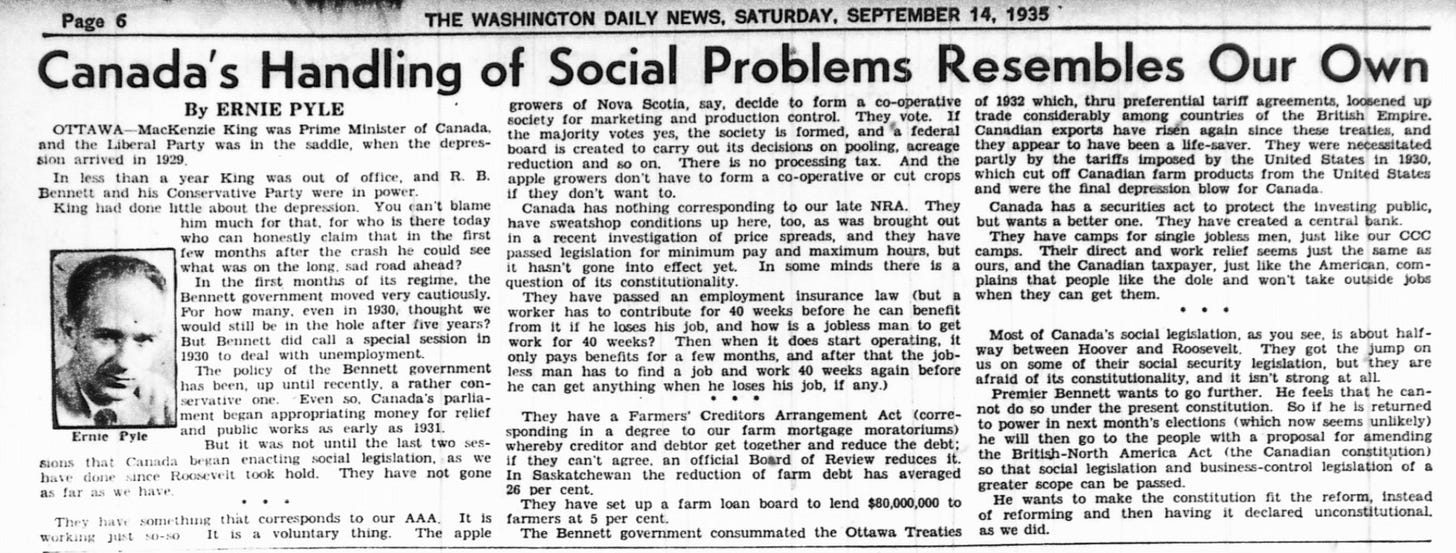September 14, 1935-Canada’s Handling of Social Problems Resembles Our Own
The Washington Daily News — Saturday, September 14, 1935
Canada’s Handling of Social Problems Resembles Our Own
By ERNIE PYLE
OTTAWA — MacKenzie King was Prime Minister of Canada, and the Liberal Party was in the saddle, when the depression arrived in 1929.
In less than a year King was out of office, and R. B. Bennett and his Conservative Party were in power. King had done little about the depression.
You can’t blame him much for that, for who is there today who can honestly claim that in the first few months after the crash he could see what was on the long, sad road ahead?
In the first months of its regime, the Bennett government moved very cautiously. For how many, even in 1930, thought we would still be in the hole after five years? But Bennett did call a special session in 1930 to deal with unemployment.
The policy of the Bennett government has been, up until recently, a rather conservative one. Even so, Canada’s parliament began appropriating money for relief and public works as early as 1931.
But it was not until the last two sessions that Canada began enacting social legislation, as we have done since Roosevelt took hold. They have not gone as far as we have.
● ● ●
They have something that corresponds to our AAA. It is working just so-so. It is a voluntary thing. The apple growers of Nova Scotia, say, decide to form a co-operative society for marketing and production control. They vote. If the majority votes yes, the society is formed, and a federal board is created to carry out its decisions on pooling, acreage reduction and so on. There is no processing tax. And the apple growers don’t have to form a co-operative or cut crops if they don’t want to.
Canada has nothing corresponding to our late NRA. They have sweatshop conditions up here, too, as was brought out in a recent investigation of price spreads, and they have passed legislation for minimum pay and maximum hours, but it hasn’t gone into effect yet. In some minds there is a question of its constitutionality.
They have passed an employment insurance law (but a worker has to contribute for 40 weeks before he can benefit from it if he loses his job, and how is a jobless man to get work for 40 weeks?) Then it does start operating, it only pays benefits for a few months, and after that the jobless man has to find a job and work 40 weeks again before he can get anything when he loses his job, if any.
● ● ●
They have a Farmers’ Creditors Arrangement Act (corresponding in a degree to our farm mortgage moratoriums) whereby creditor and debtor get together and reduce the debt; if they can’t agree, an official Board of Review reduces it. In Saskatchewan the reduction of farm debt has averaged 26 percent.
They have set up a farm loan board to lend $80,000,000 to farmers at 5 percent.
The Bennett government consummated the Ottawa Treaties of 1932 which, through preferential tariff agreements, loosened up trade considerably among countries of the British Empire. Canadian exports have risen again since these treaties, and they appear to have been a life-saver. They were necessitated partly by the tariffs imposed by the United States in 1930, which cut off Canadian farm products from the United States and were the final depression blow for Canada.
Canada has a securities act to protect the investing public, but wants a better one. They have created a central bank.
They have camps for single jobless men, just like our CCC camps. Their direct and work relief seems just the same as ours, and the Canadian taxpayer, just like the American, complains that people like the dole and won’t take outside jobs when they can get them.
● ● ●
Most of Canada’s social legislation, as you see, is about halfway between Hoover and Roosevelt. They got the jump on us on some of their social security legislation, but they are afraid of its constitutionality, and it isn’t strong at all.
Premier Bennett wants to go further. He feels that he cannot do so under the present constitution. So if he is returned to power in next month’s elections (which now seems unlikely) he wants to go to the people with a proposal for amending the British-North America Act (the Canadian constitution) so that social legislation and business-control legislation of a greater scope can be passed.
He wants to make the constitution fit the reform, instead of reforming and then having it declared unconstitutional.
💛 **Enjoyed this post?** Your support helps us continue to transcribe and promote Ernie’s work. Please click the link below to donate.





